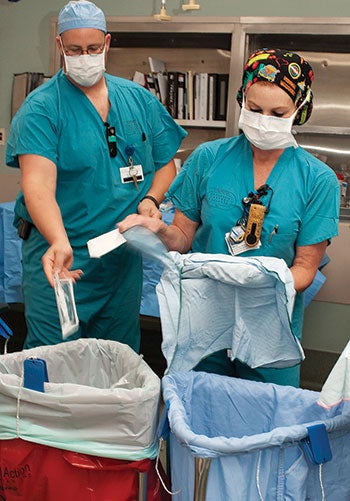2020 Health Care Climate Challenge focuses on cutting carbon emissions
 |
| PHOTO COURTESY OF VIRGINIA MASON HEALTH SYSTEM Virginia Mason Hospital, Seattle, was the first in its state to start an operating room recycling program. |
Nine leading health care institutions from across the globe, including three U.S. systems, have pledged to take action on climate change by participating in a worldwide campaign to address the troubling issue.
A global initiative of Health Care Without Harm’s Global Green and Healthy Hospitals Network, the 2020 Health Care Climate Challenge invites health care systems and hospitals to reduce their carbon footprints and protect public health from the effects of climate change.
Gundersen Health System, La Crosse, Wis.; Kaiser Permanente, Oakland, Calif.; and Virginia Mason Health System, Seattle, are among the nine that have taken the 2020 Challenge pledge to reduce carbon emissions.
Health systems from Asia-Pacific, Africa, Latin America and Europe also are participating. Together with the three U.S. health systems, they represent more than 300 hospitals.
Hundreds more hospitals from around the world are expected to join the 2020 Challenge in the coming months, says Josh Karliner, global projects director for Health Care Without Harm, and coordinator of its Global Green and Healthy Hospitals Network, Reston, Va.
He anticipates growing participation during the run-up to the worldwide meeting of heads of state at the United Nations Climate Change Conference in December in Paris. The 2020 Challenge marks the first international effort to track emissions and take measurable actions to reduce the sector’s carbon footprint.
“At a time when climate change is posing one of the greatest threats to public health, hospitals and health systems are stepping up to help the world kick its addiction to fossil fuels,” Karliner says. “This is a leadership moment for health care.”
In addition to the three U.S. health care systems, initial 2020 Challenge participants include: Counties Manukau Health, New Zealand; Hospital Israelita Albert Einstein and Hospital Sírio Libanês, Brazil; National Health Service (NHS) Sustainable Development Unit, England; Western Cape Department of Health, South Africa; and Yonsei University Health System, South Korea.
Several of the initial participants, such as Kaiser Permanente, Yonsei University Health System and the NHS, already have committed to reduce their greenhouse gas emissions by 30 percent or more by 2020. Gundersen achieved energy independence last October and now offsets 100 percent of its fossil fuel use with locally produced energy.
All 2020 Challenge participants have pledged to encourage public policy, economic development and investment strategies that move their societies away from fossil fuel dependency and toward healthy energy alternatives.
“If we as health care [are] going to play a role to protect public health from climate change, we’ve got to start by cleaning up our own house and reducing our own emissions and engaging in the public conversation about this issue,” Karliner says.
The 2020 Challenge is open for hospitals and health care systems from around the world to join; those who achieve the best results will receive awards in the future.




